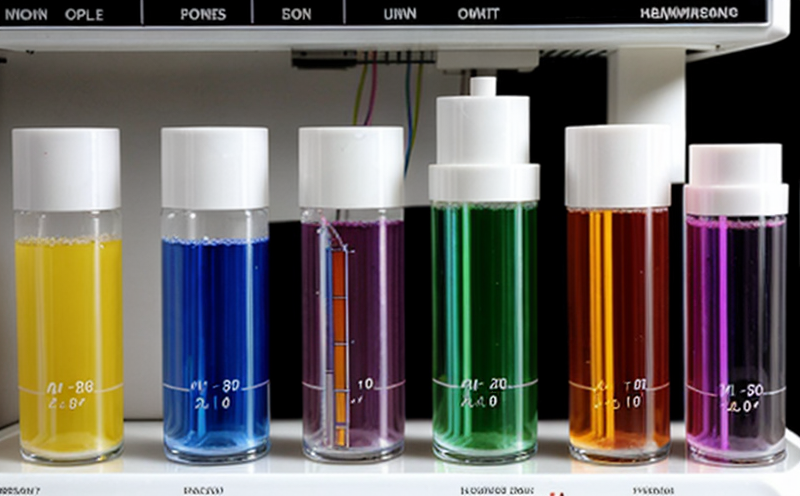GB T 5750 Water Quality Chromatographic Testing
The GB/T 5750 standard is widely recognized in China and globally as a critical guideline for ensuring water quality meets stringent health and environmental standards. This method, based on chromatographic analysis, provides a robust framework to analyze various trace elements and organic compounds present in water samples.
Chromatography plays a pivotal role in the analysis of complex mixtures by separating individual components into distinct parts. In the context of GB/T 5750, this technique allows for the precise detection of contaminants such as heavy metals, pesticides, pharmaceuticals, and other organic substances that could pose risks to human health or aquatic ecosystems.
The process typically begins with sample preparation, which involves filtering water samples to remove particulate matter and ensuring homogeneity. Subsequent steps include derivatization where necessary for enhancing the sensitivity of detection instruments like gas chromatographs (GC) and high-performance liquid chromatographs (HPLC). Chromatographic columns are chosen based on their affinity for specific analytes, allowing selective separation.
Instrumentation plays a crucial role in this testing procedure. GCs equipped with flame ionization detectors (FID) or mass spectrometry (MS) provide high sensitivity and specificity. HPLCs often use diode array detectors (DAD) to monitor multiple wavelengths simultaneously, offering comprehensive data on the sample components.
The standard GB/T 5750 specifies detailed procedures for sample preparation, instrumental configurations, calibration methods, and quality control measures. Compliance with these protocols ensures accurate results that are comparable across laboratories worldwide. This consistency is essential given the international nature of water supply networks and regulatory frameworks.
Chromatographic analysis under GB/T 5750 supports a wide range of applications including potable water monitoring, industrial wastewater treatment evaluation, environmental impact assessments, and compliance with national and regional regulations. By leveraging advanced chromatography techniques, we can identify even trace levels of contaminants, providing actionable insights for stakeholders responsible for maintaining safe drinking water standards.
The technique's versatility extends beyond mere detection; it also enables quantitative measurements necessary for regulatory compliance and scientific research. For instance, in potable water monitoring, the ability to pinpoint low concentrations of heavy metals helps inform public health policies aimed at preventing adverse effects from prolonged exposure.
- International Acceptance and Recognition:
- The GB/T 5750 standard has gained significant acceptance within China’s regulatory framework and is increasingly recognized internationally. It aligns well with other global standards such as ISO 6341 for pH measurement, which complements its role in ensuring water quality.
Given the growing emphasis on sustainable development and public health, adhering to rigorous testing methodologies like those prescribed by GB/T 5750 becomes increasingly important. It fosters trust between consumers and providers of potable water services while promoting responsible practices among industries reliant on clean water resources.
Eurolab Advantages
At Eurolab, we pride ourselves on delivering superior quality chromatographic testing services through our advanced facilities and experienced team. Our state-of-the-art laboratories are equipped with cutting-edge instrumentation capable of handling complex analyses required by GB/T 5750 standards.
We employ highly trained technicians who stay abreast of the latest developments in chromatography technology to ensure accurate and reliable results every time. Our commitment extends beyond just meeting compliance requirements; we offer expert advice tailored specifically for your unique needs, whether you're a quality manager looking to enhance product safety or an R&D engineer aiming to innovate within your field.
Our services include but are not limited to routine water quality checks, specialized trace element determinations, and comprehensive organic compound profiling. By partnering with Eurolab, you gain access to robust support that enhances decision-making processes related to water management strategies.
We offer flexible turnaround times to accommodate urgent requests without compromising on precision or thoroughness. Additionally, our transparent communication ensures clients are kept informed throughout the testing process, allowing them to make well-informed decisions based on accurate data.
Quality and Reliability Assurance
To maintain high levels of quality and reliability in all our services, Eurolab adheres strictly to international best practices and industry norms. Our robust quality assurance measures encompass rigorous training programs for staff members, regular calibration checks on analytical equipment, and continuous improvement initiatives aimed at enhancing service delivery.
Our dedicated Quality Assurance Department oversees every aspect of the testing lifecycle, from initial sample receipt through final report generation. This ensures consistency in methodology application across different projects while maintaining strict adherence to relevant standards including GB/T 5750.
We also maintain stringent quality control protocols that involve internal audits and external peer reviews conducted by independent experts within the field. These efforts contribute significantly towards building confidence among our clients regarding the accuracy, reliability, and integrity of our testing outputs.
International Acceptance and Recognition
The GB/T 5750 standard enjoys widespread acceptance not only within China but also internationally. Its alignment with other globally recognized standards like ISO 6341 for pH measurement underscores its relevance in the global context.
- ISO 6341 - pH Measurement: This international standard provides guidelines for measuring pH values accurately, which is crucial when assessing water quality parameters under GB/T 5750. The consistency between these two standards ensures compatibility and comparability of results obtained from different laboratories.
The recognition extends to various sectors including healthcare providers, environmental agencies, educational institutions, and private enterprises operating in water-related industries. Compliance with GB/T 5750 helps businesses meet regulatory requirements while enhancing their reputation for excellence in water quality management.





